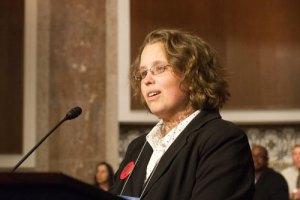As advocates we must embrace intersectionality in all we do because no movement’s issues are isolated issues.
By Nicole LeBlanc
As we celebrate Women’s History Month and Developmental Disability Awareness Month, we must recognize the struggles women continue to face in our society and systems of oppression. The Covid-19 pandemic has laid bare the social and economic injustices that women especially those with disabilities face. The Covid pandemic has driven millions of women especially mothers to drop out of the workforce due to caretaking responsibilities and layoffs. As of last December women lost 156,000 jobs that is equal to 100% of jobs lost in that month alone. Since the start of the pandemic 2.5 million women left the labor market compared to 1.8 million for men. As a society we must do better to ensure our workforce can accommodate the unique needs of women and women with disabilities in general.
The Covid-19 pandemic offers a perfect opportunity to reset the social contract for all workers especially women with disabilities and single parents.
One of the biggest disparities women face during Covid and beyond is the fact women often work in female dominated industries like hospitality, food services and home care. While on top of that they have to balance family caretaking responsibilities while also maintaining household upkeep. In addition to dealing with barriers like poor access to childcare, and if they have kids COVID has necessitated them needing to take a more active role in ensuring kids are participating actively in remote schooling. Our society can and must do better at supporting women in the workforce and balancing the cost of unpaid childcare, caregiving of seniors and adults with disabilities.
As we begin to dream of a vision for a post-pandemic world it is my hope that launch an aggressive economic policy agenda to support women and women with disabilities that enables them to get ahead in today’s world while being accommodating to the challenges of parenting and maintaining a household.
Some ideas for improving the lives of women include but not limited to:
1. Expand childcare support for all so that they can continue to stay in the workforce.
2. Employers need to embrace a shorter work week and flexible scheduling which is something that can benefit us all. In many countries full-time is considered 30-34 hours instead of 40 and some countries have shortened the work day and embraced a 4 day work week. By doing this especially during a pandemic it can enable women to meet daily obligations and it can protect our mental health from pandemic burnout long term.
3. Pay all women equal to the same wage as men. There is no better time for equal pay like the present.
4. Change funding policies and make investment to pay Direct Support Professionals, and home-care staff a livable wage. Caregiving is a job that must be recognized and fairly compensated.
5. Adopt paid leave and sick days for all workers. No one should have to worry about income loss due to illness or illness of a family member.
6. Adopt Universal Basic Income so that parents can go back to the days when 1 person worked Full Time and other worked part-time.
7. Outlaw salary history in the hiring process nationwide.
8. Pass the Equal Rights Amendment
9. In the disability world study and develop effective ways to address the gender bias in the autism community. Autism is often thought of as a boy thing and it looks different in autism, girls tend to mask by “ passing, or acting as normal as one can be socially until social demands to daily living become too much and they hit rock bottom or have a crisis in my case like when I was at Job Corps for 1.5 years during my 20s where I develop anxiety, Trauma and became more aware of my differences. Editor’s Note: Read Challenging Gender Stereotypes in Autism and Mental Health Diagnoses
10. In the area of leadership we need more women on the frontlines when it comes to managing crises like the COVID19 pandemic. Given that women leaders have dealt with COVID better globally.
11. We must embrace intersectionality in all we do because no movement’s issues are isolated issues. They are all connected in one way or another.
LEAD ON!
Header Image submitted to The Art of Autism for Women’s History Month by WenofZen “Beautiful Womanhood”.

Nicole is employed at the Human Services Resources Institute where she coordinates the Person-Centered Advisory and Leadership Group for the National Center on Advancing Person-Centered Practices and Systems (NCAPPS), ensuring that the Group informs and supports the direction of the NCAPPS efforts. She also helps develop cognitively accessible project materials and resources that reflect the experiences of people with disabilities. Since November 2017, Nicole has been the advocacy specialist for the Southern Region of Maryland where she assists self-advocates in dealing with the challenges of the service system. From February 2018 to September 2018, Nicole served as the Dr Ruth Sullivan policy fellow. From March 2018 to March 2019, Nicole was the SARTAC-Self Advocacy Resource and Technical Assistance Center fellow for NDRN where she created a booklet on advocating for policies that promote Competitive Integrated Employment (‘Real Jobs for Real Pay’).
Nicole LeBlanc was the 2019 recipient of the David Joyce Advocate of the Year Award by the Autism Society of America. The award is given to an individual with autism who has advanced the well-being of others on the spectrum.








